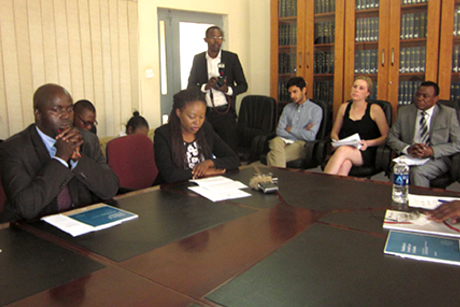Law students write handbook on Zambia juvenile justice

At an Aug. 6 event in Lusaka, Zambia, the Cornell Law School and Zambia’s Center for Law and Justice released a new handbook for Zambian judicial officers and legal practitioners on juvenile law. Produced by the Avon Global Center for Women and Justice and the International Human Rights Clinic, both of Cornell Law School, and the Center for Law and Justice, the “Handbook on Juvenile Law in Zambia” is the first-ever practice guide on Zambian juvenile law.
At the event, hosted by the Law Association of Zambia, a panel of Zambian juvenile-law experts, including magistrates, prosecutors and police, reflected on the handbook’s insights and discussed strategies to address challenges that prevent juveniles from accessing justice through the courts. Cornell Law School Professor Muna Ndulo, director of the Institute for African Development, moderated the panel.
Quoting Nelson Mandela, Ndulo pointed out “there can be no keener revelation of a society’s soul than the way in which it treats its children.” He observed, “It is shameful that after 50 years of independence, the Zambian justice system does not have adequate facilities to help reform children that come into conflict with the law. It means that in the post-independence era, absolutely nothing has been done in terms of creating new infrastructure.”
Ndulo emphasized the need for the community to take responsibility of these juveniles and for better public education.
“I wouldn’t worry about who is causing the problem because society must take responsibility,” he said. “It’s very important to look at the comparative experience, as to what others are doing. … Many of the issues raised here are not specific to Zambia.”
Zambia’s domestic laws grant children and young people special legal protection, yet many children remain vulnerable and are unable to access the protection to which they are entitled. Magistrates, prosecutors and legal practitioners representing juveniles grapple with enormous backlogs, lack research capacity, and do not have access to statutory updates or relevant case law. As a result, juveniles in contact with the law, including child victims of abuse, are denied justice. The handbook addresses this gap by providing a compilation and analysis of Zambian juvenile law, which governs juveniles who come into contact with the law as defendants, witnesses or victims.
The handbook addresses the constitutional, statutory and human rights framework of juvenile law, special issues that arise in cases of child sexual abuse, and procedural protections for juvenile witnesses.
The handbook was co-authored by Chris Sarma and Amy Stephenson, Cornell Law School J.D. candidates who work in the International Human Rights Clinic. They were supervised by Liz Brundige, assistant clinical professor and executive director of the Avon Global Center, and Tinenenji Banda, also a J.D. candidate at Cornell Law School and a co-founder and director of the Centre for Law and Justice, a Zambian organization that works to protect and promote the welfare of children and juveniles.
“Judges, magistrates, prosecutors and lawyers have a range of tools at their disposal to protect the rights of juveniles,” Brundige explained. “For example, international law standards counsel against juvenile detention while a new Zambian statute enables magistrates to issue orders of protection that shield juveniles from abuse. Understanding and applying these tools is critical to ensuring that all children and young people have meaningful access to justice.”
Media Contact
Get Cornell news delivered right to your inbox.
Subscribe